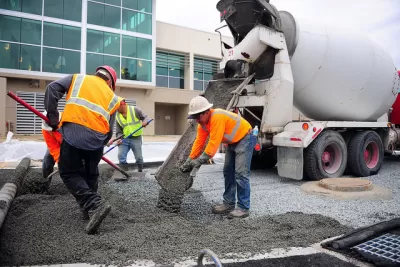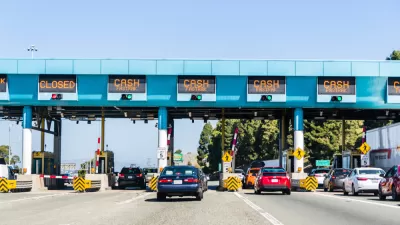Voters looking for a reason to vote against Prop 72, which provides a tax break for homeowners who install rainwater capture systems, won't find one. None were submitted. Proponents of measures for parks, climate, and transportation are not so lucky.

KQED science editor Danielle Venton interviews a Petaluma homeowner who installed a $300 rainwater capture system three years ago "that has already paid for itself" in savings on his water bill. "From the perspective of water managers, [he] is doing something great, but the cost of that rainwater system adds to the value of the house an that could mean higher property taxes, especially for some big systems that can cost thousands of dollars," she states on the audio version of the article.
"That's why lawmakers put Proposition 72 on the ballot," based on Senate Constitutional Amendment (SCA) 9 sponsored by Sen. Steve Glazer, D-Concord, which passed both chambers unanimously, adds Venton.
Rainwater systems catch rain from the roof of a home and siphon it to a large barrel, or even larger cistern, for outdoor use. Prop 72 aims to encourage rainwater catchment by ensuring that homeowners who install a system won't have to pay property tax on the increased value of the home, similar to the way the tax code treats rooftop solar, until the house is sold.
"Proposition 72 is one of the easier questions on the June 5 ballot," opines the Los Angeles Times editorial board on April 24. "Homeowners should be rewarded, not penalized, for collecting the rainwater that falls on their roofs and for using it on their landscaping to save precious tap water."
==========================================================================================
Three more propositions facing voters on June 5
- Proposition 68: $4 billion in general obligation bonds for state and local parks, environmental protection projects, water infrastructure projects, and flood protection projects.
- Proposition 69: Transportation Taxes and Fees Lockbox.
Remember last year's 12-cents per gallon gas tax increase, aka Senate Bill 1? Revenues from the additional gas tax and 20-cents per gallon diesel tax increase are constitutionally required to be spent on transportation, mostly roads, per Article 19,
While the legislature promised all of the SB 1 revenues, projected to be $5 billion annually, would be spent on transportation, two of the new revenue measures, an annual transportation improvement fee [ppt] between $25 and $175 based on vehicle value, and a four percent increase in the diesel sales tax do not fit into the Article 19 'transportation lockbox.'
Prop. 69 fixes that problem, or makes it worse, depending on one's perspective. In addition, it would apply to the entire 13 percent diesel sales tax (scroll down to 'diesel'), not just the additional increment.
Regardless of how one feels about transportation lockboxes, with a repeal of all of the SB 1 taxes and fees all but certain to be on the ballot in November, it can't hurt.
- Proposition 70: Cap-And-Trade Revenues
2017 was a remarkably successful legislative year for transportation and the environment in California. Another landmark bill that passed was AB 398, allowing for the continuation of the nation's only state-run carbon trading program. Similar to SB 1, a super-majority vote was needed, which meant getting a few Republican votes. From Planetizen:
A companion constitutional amendment pushed by Republicans, ACA 1, that will require a two-thirds vote in 2024 by the legislature to pass an expenditure plan for cap-and-trade revenues, known as the Greenhouse Gas Reduction Fund, in 2024. First it must pass a vote by the general electorate in June 2018.
So Californians will essentially be voting on a measure that affects a budgetary item in 2024. For all other years, a simple majority vote will determine the expenditure plan for cap-and-trade revenues.
Environmentalists are lined-up against Prop. 70, unlike AB 398 where they were divided because of concessions made to ensure its passage.
What's very strange is seeing Gov. Brown signing the "pro" argument because if it passes, it endangers one of the governor's "legacy" projects: "Gov. Jerry Brown's High-Speed Gamble." Presumably, it was a promise he made to secure Republican votes to pass AB 398.
FULL STORY: Proposition 72: Capture Rainwater, Get a Tax Break

Alabama: Trump Terminates Settlements for Black Communities Harmed By Raw Sewage
Trump deemed the landmark civil rights agreement “illegal DEI and environmental justice policy.”

Study: Maui’s Plan to Convert Vacation Rentals to Long-Term Housing Could Cause Nearly $1 Billion Economic Loss
The plan would reduce visitor accommodation by 25% resulting in 1,900 jobs lost.

Why Should We Subsidize Public Transportation?
Many public transit agencies face financial stress due to rising costs, declining fare revenue, and declining subsidies. Transit advocates must provide a strong business case for increasing public transit funding.

Paris Bike Boom Leads to Steep Drop in Air Pollution
The French city’s air quality has improved dramatically in the past 20 years, coinciding with a growth in cycling.

Why Housing Costs More to Build in California Than in Texas
Hard costs like labor and materials combined with ‘soft’ costs such as permitting make building in the San Francisco Bay Area almost three times as costly as in Texas cities.

San Diego County Sees a Rise in Urban Coyotes
San Diego County experiences a rise in urban coyotes, as sightings become prevalent throughout its urban neighbourhoods and surrounding areas.
Urban Design for Planners 1: Software Tools
This six-course series explores essential urban design concepts using open source software and equips planners with the tools they need to participate fully in the urban design process.
Planning for Universal Design
Learn the tools for implementing Universal Design in planning regulations.
Smith Gee Studio
Alamo Area Metropolitan Planning Organization
City of Santa Clarita
Institute for Housing and Urban Development Studies (IHS)
City of Grandview
Harvard GSD Executive Education
Toledo-Lucas County Plan Commissions
Salt Lake City
NYU Wagner Graduate School of Public Service





























